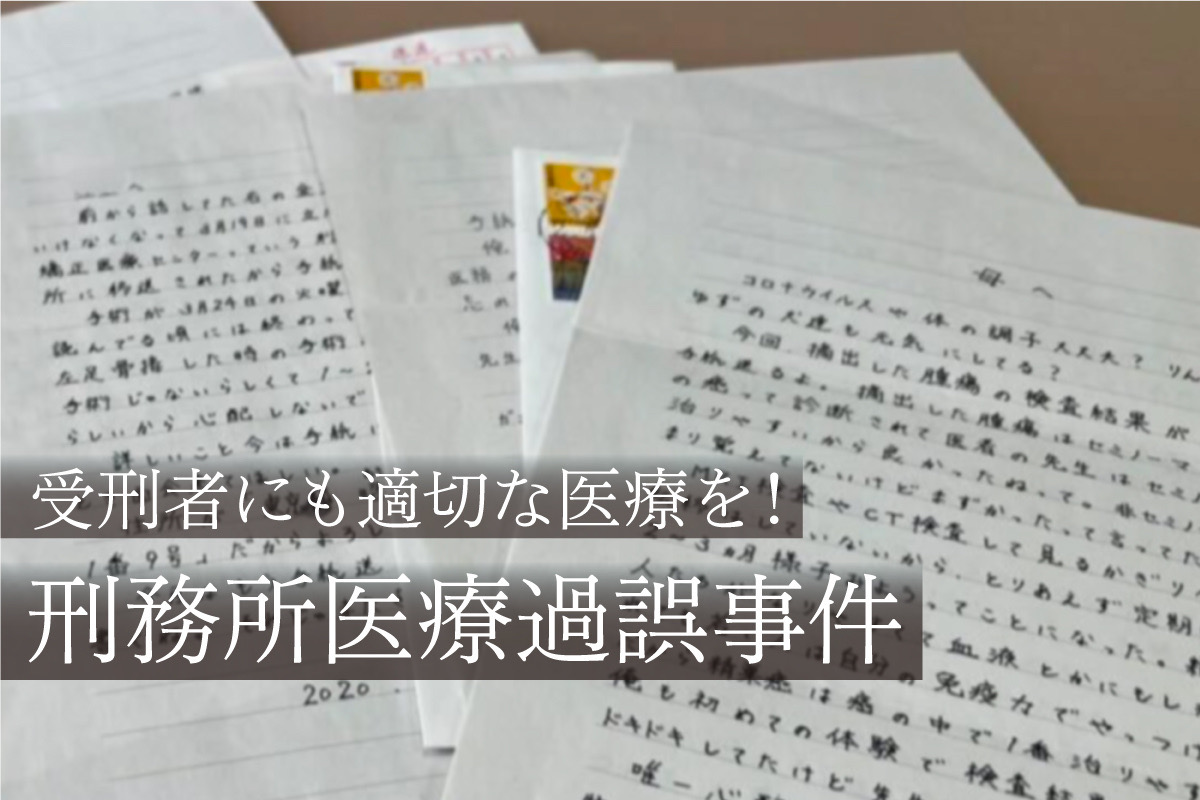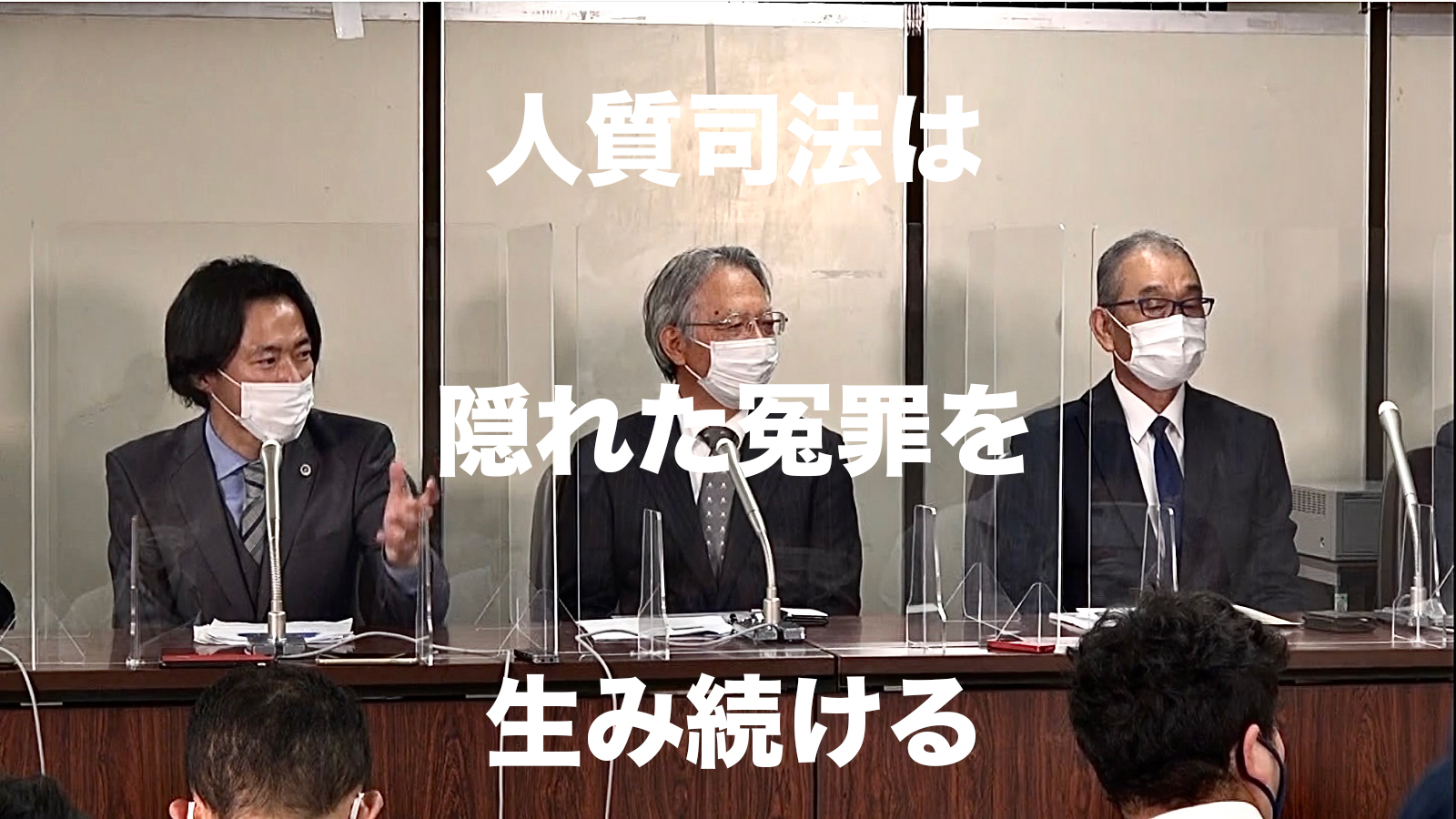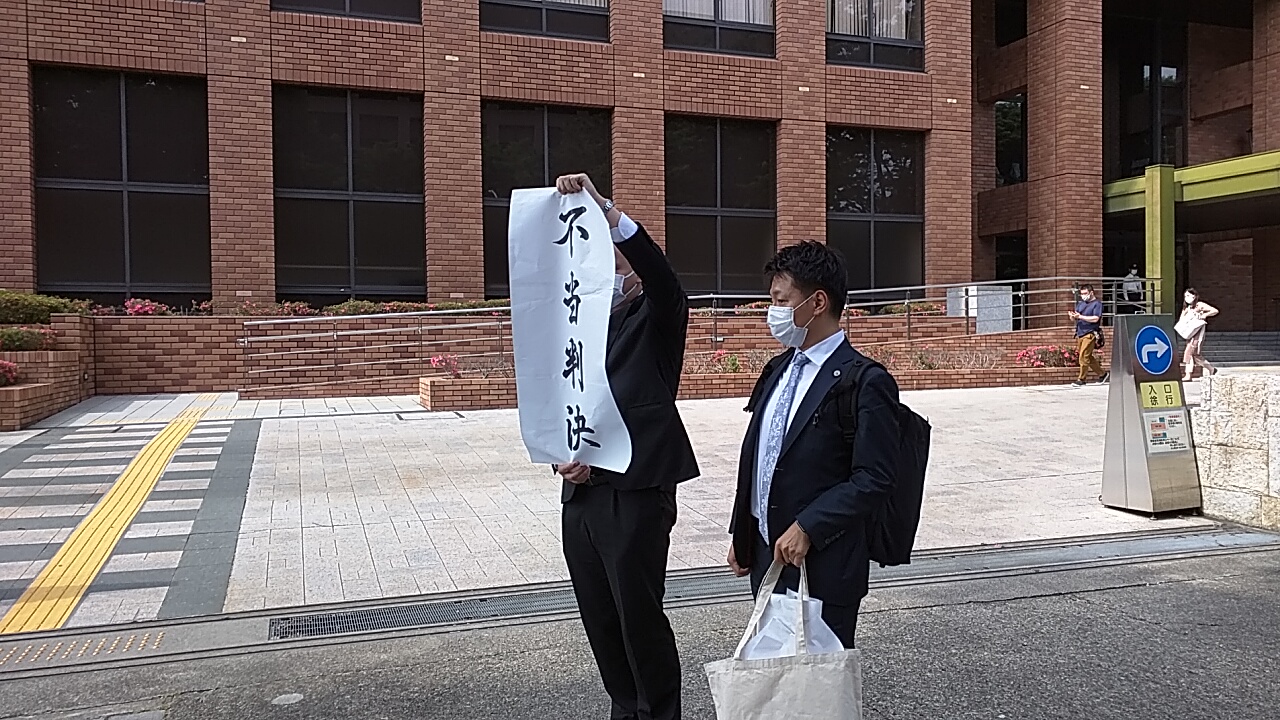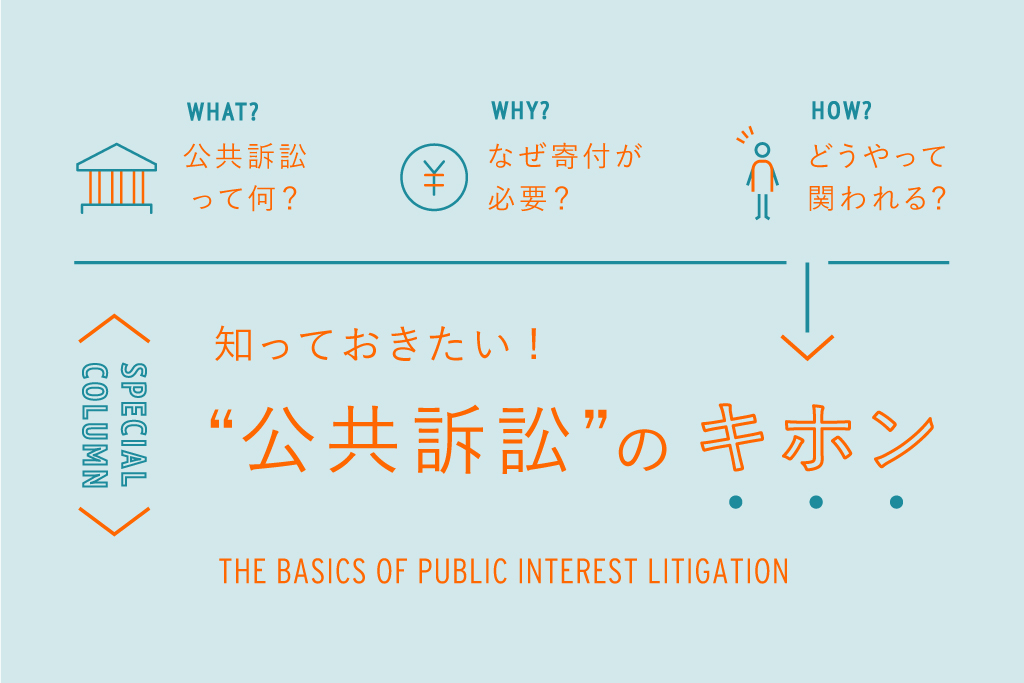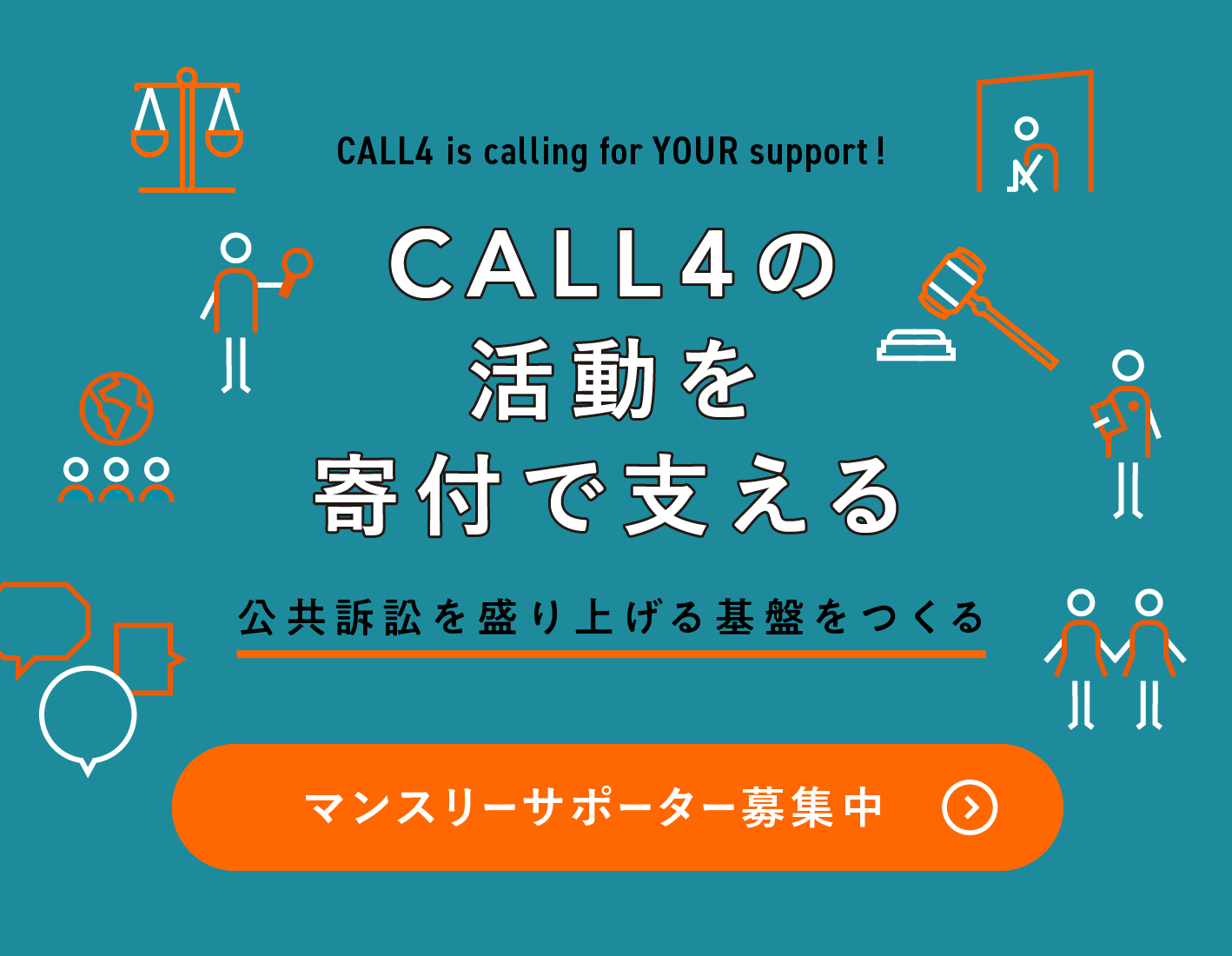日本の「黙秘権」を問う訴訟 〜56時間にわたる侮辱的な取調べは違法〜 Lawsuit Questioning Japan’s ”Right to Remain Silent” - 56 Hours of Insulting Interrogation is Illegal -
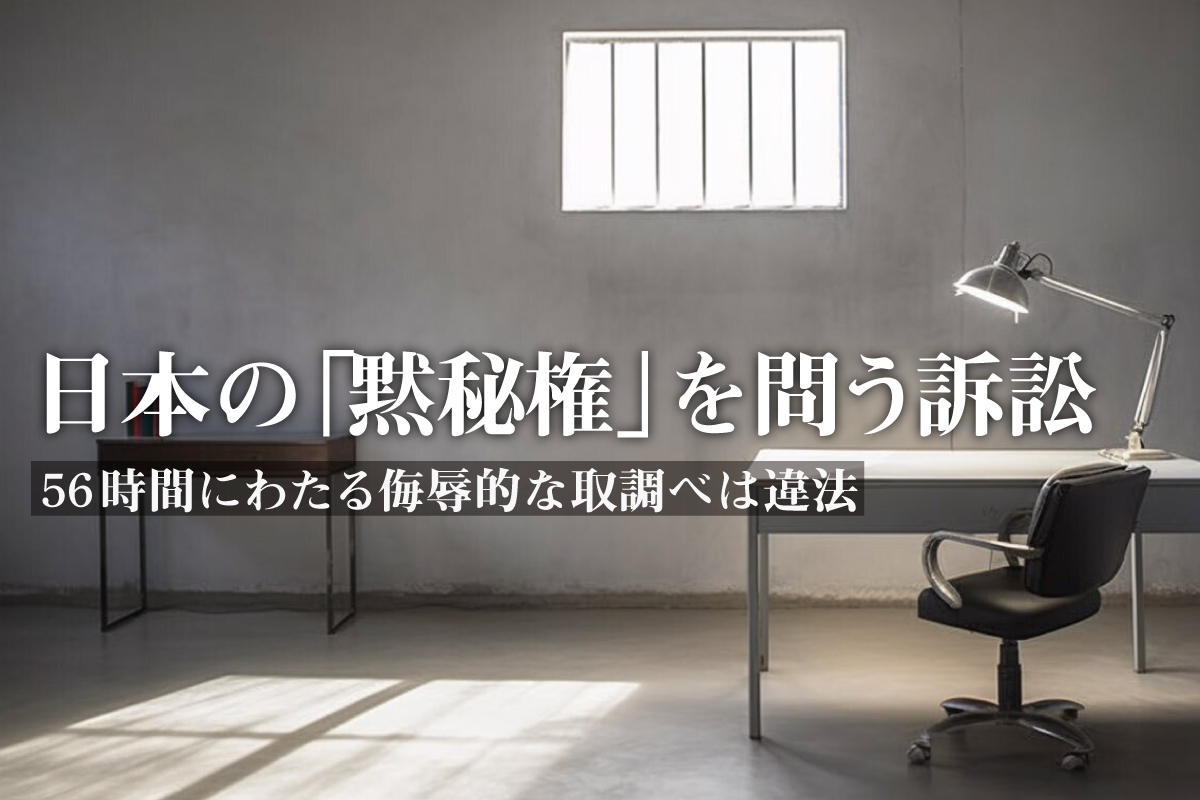
犯罪の嫌疑をかけられた原告の江口さんは、黙秘権の行使を宣言したにもかかわらず、約21日間・約56時間にわたって検察官から「ガキ」「お子ちゃま」など、さまざまな暴言、嫌味、侮辱を浴びせられました。これは「取調べ」なのでしょうか。この訴訟は、裁判を通してこのような取調べが違法であることを明らかにすることで、黙秘権が真に保障される社会にするための訴訟です。 The plaintiff, Mr. Eguchi, suspected of a crime, exercised his right to remain silent during interrogation. Despite this, he was subjected to various forms of verbal abuse, mockery, and insults, such as ”gaki” and ”okochama,” which derogatorily mean “brat” or “child,” from the prosecutors. The interrogation spanned a total of 56 hours over 21 days. Can this be considered a legitimate ”interrogation”? This lawsuit aims to establish that such interrogation practices are illegal, thereby promoting a society where the right to remain silent is truly guaranteed.
はじめに
「黙秘権」と聞くと、都合の悪いことを黙っている卑怯な方法というイメージをお持ちではないでしょうか。
「取調べ」と聞くと、黙秘する卑怯な被疑者を刑事が厳しく追及し、自白に追い込むというイメージをお持ちではないでしょうか。
そして、その口を割らせる捜査官は、正義のヒーローだというイメージをお持ちではないでしょうか。
実はこれらのイメージは、ドラマなどが作り上げた誤ったイメージに過ぎません。取調べには、憲法が保障する大切なルールがあるのです。
日本国憲法は、すべての被疑者に対して「黙秘権」を保障しています。
日本国憲法38条1項 何人も、自己に不利益な供述を強要されない。
取調べで黙秘をすることは、憲法上の権利の行使です。
やっていないなら黙秘せずに潔白を主張すれば良いと思うかもしれません。しかし、被疑者が潔白を主張しても、取調べは終わりません。捜査官には捜査官の想像する筋書きがあり、捜査官が望むとおりの内容の供述をするまで、一人きりで 延々と追及や説得を受けることになります。そのような状況ではやがて心が折れてしまい、本当は違うのに罪を認めてしまうことになりかねません。身体を拘束されて心身が弱っている状況であれば、このおそれはいっそう高くなります。
日本でも過酷な取調べによって、自分が犯していない罪の自白を強要され、無実の人が冤罪になった歴史があります。冤罪を生む過酷な取調べをなくすためにも、黙秘権保障の重要性は強調しても強調しすぎることはありません。
取調べにおいて被疑者が黙秘することは、ほとんどの国で認められている基本的で正当な権利の行使です。
ところが、実際に「黙秘権」を行使することはとても大変です。いざ黙秘権を行使しようとすれば、捜査官は「黙秘していると拘束が長くなるぞ」「裁判で不利になるぞ」「弁護士の言うことを聞いて、どうなっても知らないぞ」などとあの手この手で供述させようとしてきます。取調べで何を言われても我慢して、結果的に黙っていられたという状態は、黙秘権が保障されている状態といえるのでしょうか。日本において、黙秘権は本当に保障されているといえるのでしょうか。
この事件では、犯罪の嫌疑をかけられた江口さんが、黙秘権の行使を宣言したにもかかわらず、約21日間・約56時間にわたって検察官から取調べと称してさまざまな暴言、嫌味、侮辱を浴びせ続けられました。
この訴訟は、裁判を通してこのような取調べが違法であるということを明らかにし、黙秘権が真に保障される社会にするための訴訟です。
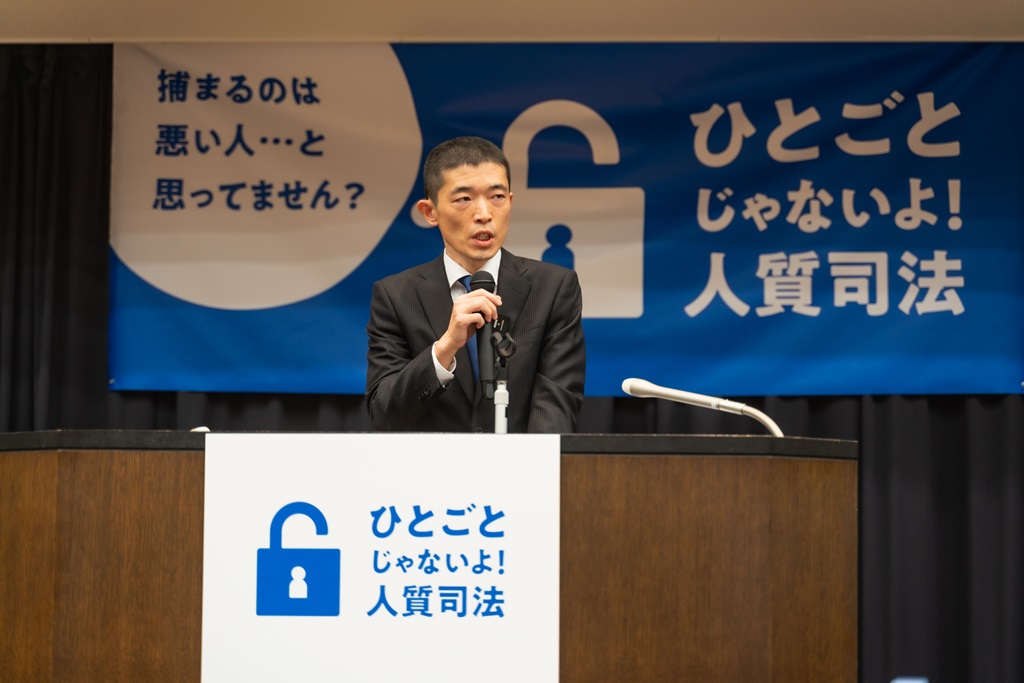
▲「人質司法サバイバー国会」に登壇される江口さん(西愛礼撮影)
事案の概要
当時弁護士だった江口さんは、横浜地検特別刑事部に逮捕されました。
逮捕後の取調べの冒頭で、江口さんは無罪を主張して黙秘の意思を表明し、一貫して黙秘権を行使しました。しかし、検察官は21日間にわたって取調べを続け、取調べ時間は56時間以上に及びました。
取調べの中で、検察官は江口さんを「僕ちゃん」「お子ちゃま」「ガキ」などと呼び、「うっとうしい」「どうやったらこんな弁護士ができあがるんだ」「嘘をつきやすい体質」「詐欺師的な類型」などと罵倒したり、弁護人の活動を侮辱したりする発言をしました。これらの発言は、捜査の目的とは全く関係がないものです。
また、事件と全く関係がない江口さんの中学の成績に触れて、能力について揶揄したり、家族や指導教官など周囲への負担を盾にしたりして、江口さんの人格を否定するような場面もありました。
このような行動によって、江口さんは甚大な精神的苦痛を受けました。
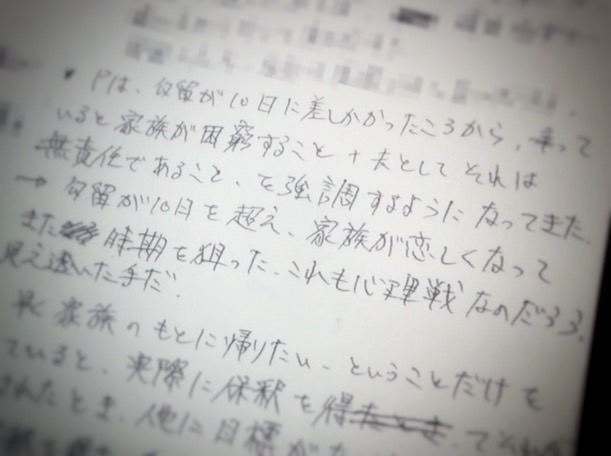
▲江口さんが勾留中に書いていたメモ
今回のケースは、このような検察官の行為は江口さんの権利を侵害し、違法であるとして、2022年3月、国に損害賠償を求め提訴したものです。
三つの権利侵害
私たちは、検察官による取調べは次のように江口さんの権利を侵害したものだと主張しています。
①黙秘権の侵害
江口さんは逮捕後の取調べの冒頭で「私からはこれ以上話すことはありません」と述べて黙秘権行使の意思を明確にしました。しかし、検察官は取調べを継続し、21日間にわたって56時間を超える取調べをしました。
密室での長時間の取調べは、孤立無援でそれ自体が供述を強制する雰囲気をもつものです。黙秘権行使の意思を無視して取調べを受けることを強いる行為は、供述の強要そのものです。しかも、検察官は江口さんの人格や弁護士としての能力を侮辱する言動を繰り返しました。
このような言動は、黙秘する被疑者に対しての問いかけや、話すよう説得するという範囲を超えて、精神的に圧迫することで供述を強要しようとするものであり、黙秘権を侵害する違法行為です。
② 弁護人依頼権の侵害
日本では、弁護人依頼権が保障されています。
日本国憲法34条前段 何人も、理由を直ちに告げられ、且つ、直ちに弁護人に依頼する権利を与へられなければ、抑留又は拘禁されない。
この弁護人依頼権は、被疑者が弁護人を選任することは妨害されてはならないというだけでなく、被疑者に対し、弁護人を選任した上で、弁護人に相談し、その助言を受けるなど弁護人から援助を受ける機会をもつことを実質的に保障しています。
そして、被疑者が弁護人から援助を受けるためには、被疑者と弁護人の信頼関係が欠かせません。取調官が被疑者と弁護人との信頼関係を破壊する行為をすれば、弁護人から援助を受ける機会をもつ権利を侵害するものです。
この事件では、検察官は、江口さんが弁護人を選任していることについて「(弁護人に)迷惑かけないでもらいたいですよねえ。自分でやればいいじゃん」などと発言したり、弁護人の活動について「着眼点がとろい」、「稚拙な主張」などと弁護人の活動を侮辱する発言をしたりしています。
これは江口さんに、弁護人に依頼を継続して良いのか不安にさせ、また弁護人の活動に不信感を植えつけようとするものです。江口さんと弁護人の信頼関係を破壊する行為であり、弁護人依頼権を侵害する違法行為です。
③ 人格権の侵害
検察官は、江口さんの取調べを通じて全般的に、江口さんの人格、弁護士としての能力、防御方針などを侮辱する言動を繰り返していました。これらの言動は、江口さんの人格権を侵害する違法行為です。
これらの主張に対して国は、56時間を超える取調べをしたことや、取調べでの検察官の発言内容自体は認めた上で、江口さんの黙秘権等を侵害するものではなく、適法な取調べであったと主張しています。
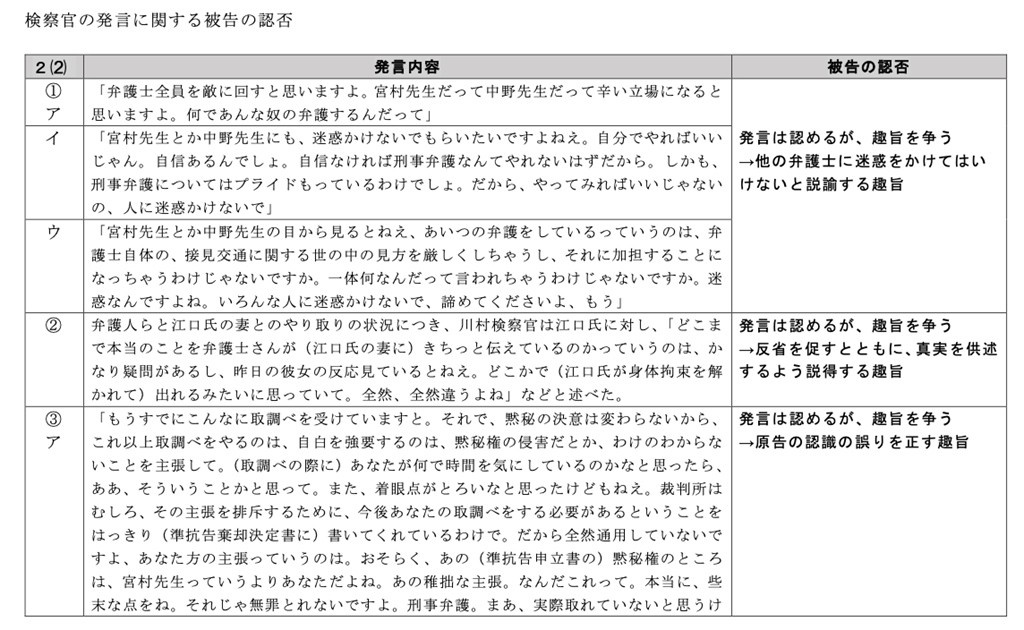
▲検察官の発言に関する国の主張対照表(弁護団作成)。全文はこちらから
検察官が56時間を超える取調べをしたことや、取調べでの検察官の言動を裁判所がどのように評価するのかが争点です。
社会的意義
日本の捜査実務の改善
黙秘権を行使しても取調べを受けさせられるのは、江口さんのケースに限られません。憲法上の権利を行使している被疑者に忍耐を強いる事態が、日常的に広く起きています。
黙秘権を行使している人に対して取調べを行うことが本当に許されるのか、捜査官は何を言ってもいいのか悪いのか。黙秘権をめぐるこれらのポイントは、世界各国共通の課題です。
日本が1979年に批准した自由権規約(国際人権規約)は、「自己に不利益な供述又は有罪の自白を強要されないこと」の十分かつ平等な保障を要求しています(14条3項(g))。
日本の捜査実務はこれまで、世界の議論から取り残されてきました。
1989年2月、国際人権連盟事務総長を務めるエティエンヌ・ジョーデル氏らが、日本の刑事司法に関する調査結果を取りまとめた報告書を国連人権委員会に提出しました。そこでは、日本の捜査実務について、「日本の取調べ官は、心理的な虐待を加えている」、「日本国は、自ら罪を負わせることを強制されない権利並びに自白を強制されない権利を侵害している」などと厳しく指摘されていました。*平野龍一「『国際人権連盟』報告書(パーカー=ジョーデル報告書)」法律時報61巻7号92頁(1989年)
それから35年が経った現在も、日本の捜査実務は改善していません。
この訴訟の判決は、黙秘権を軽んじてきた日本の捜査実務に、間違いなく大きな一石を投じることになります。
取調べ映像の公開
取調べ適正化のため2019年から一部の事件で取調べがビデオで撮影されるようになりましたが、今までこの取調べの映像は国に賠償を求める訴訟で利用されることはほぼありませんでした。
この事件では実際の取調べ映像を提出するよう国に申立て、映像は裁判の証拠となり、公開の法廷で再生されました。このこと自体に一つの先例的意義があります。(取調べ映像公開までの経緯は、こちらの弁護団の解説記事をご覧ください。)
そして、私たち原告弁護団は、取調べの実態を多くの人に知ってもらうため、その映像をインターネット上で公開しました。
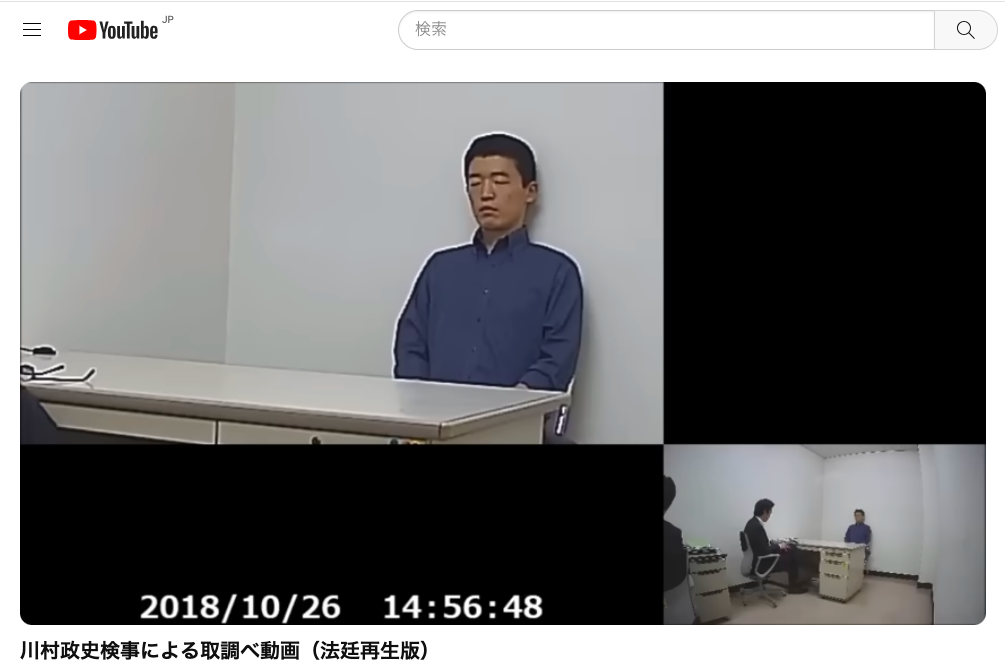
▲YouTubeにアップされた江口さんの取調べ時の動画。視聴はこちらから
取調べの実態はいかなるものか、黙秘権を行使したらどのような目にあうのか、それらは憲法の趣旨に沿うものなのか。これらの問題は、この社会に生きる私たち全員にとっての共通の問題です。
資金の使途
これまでに訴訟提起の際の手続費用や、研究者への意見書執筆依頼費用が発生しています。また、今後、江口さんに対して行われた取調べの実態を国内外のみなさまに広く知っていただく情報発信のための動画作成などを予定しており、そのための費用も発生します。
皆様からいただいた資金は、この裁判の遂行に必要な費用のほか、取調べの実態を発信する活動の費用に充てさせていただきます。
原告の思い
自分自身が被疑者になって、初めて、取調べのリアルな実態を知りました。
私は、現実にどのような取調べが行われているかを、多くの人に知ってほしいと思いました。そして、捜査官が「取調べ」の名の下に被疑者を延々と罵倒することは違法ではないのか、裁判所に判断してほしいと思いました。そのためにこの裁判を起こしました。
取調べを受けることは、いつでも、誰にでも起こりうることです。
みなさんに取調べのリアルな実態をお伝えして、ひとごとでなく自分の問題として考えてもらいたいと思い、裁判の資料を公開し、クラウドファウンディングを行うことにしました。
担当弁護士のメッセージ
取調べの実態を明らかにし、現在の実務が憲法が考えた黙秘権の保障とはかけ離れた地点にあることをみなさんに知ってもらうことは、この事件を担当することになった私達の使命です。そのためにまず取調べの動画を公開しました。次は、このような取調べを受けた江口さんがどのように感じたのかをお伝えする動画を公開する予定です。
今後も積極的に情報を発信し、皆さんに取調べの実態を知っていただくことで、取調べの現状を変えていきたいと思います。
▲動画の撮影をする弁護団と江口さん。動画はこちらで公開する予定です
担当弁護士の紹介
宮村啓太 第二東京弁護士会 宮村・井桁法律事務所
趙 誠峰 第二東京弁護士会 Kollectアーツ法律事務所
髙野 傑 第二東京弁護士会 早稲田リーガルコモンズ法律事務所
おわりに
現在の我々の社会は、黙秘権が保障されているとはいえません。
今このときも行われている違法な取調べの実態、これをみなさんに伝えていきます。
そのためのご支援を、みなさまどうかお願いいたします。
この裁判は日本の刑事司法を良い方向に変えるものです。黙秘権が真に保障され、精神的拷問など行われない社会へと、みなさんと一緒に進んでいきたいと思っています。
*Translated by Google translate
Introduction
When you hear the term "right to remain silent," you probably think of it as a cowardly way of keeping quiet about something inconvenient.
When you hear the word "interrogation," you probably have the image of a detective harshly pursuing a cowardly suspect who remains silent and forcing him to confess.
And don't you have the image that the investigator who makes that statement is a hero of justice?
In reality, these images are just false images created by dramas. There are important rules for interrogations that are guaranteed by the Constitution.
The Japanese Constitution guarantees all suspects the right to remain silent.
Article 38, Paragraph 1 of the Japanese Constitution : No person shall be forced to make statements that are disadvantageous to him or her.
Remaining silent during an interrogation is an exercise of your constitutional right.
If you didn't do it, you might think that it would be better to maintain your innocence and not remain silent.
However, even if the suspect claims innocence, the interrogation does not end.
The investigator has a scenario that he or she imagines, and is left alone with endless questioning and persuasion until the investigator makes a statement that matches the investigator's wishes.
In such a situation, your heart may eventually break down and you may end up admitting guilt even though it's not really the case.
This risk is even higher if you are physically restrained and your body and mind are weakened.
Even in Japan, there is a history of innocent people being falsely accused by being forced to confess to crimes they did not commit through harsh interrogations. The importance of guaranteeing the right to remain silent cannot be overemphasized in order to eliminate harsh interrogations that lead to false accusations.
Suspects' remaining silent during interrogations is a fundamental and legitimate right recognized in most countries.
However, actually exercising the "right to remain silent" is very difficult. When you try to exercise your right to remain silent, the investigators say, ``If you remain silent, your detention will be longer,'' ``You'll be at a disadvantage in court,'' and ``Listen to your lawyer, and you won't know what will happen.'' They will do whatever they can to get you to give a statement.
If a person is able to endure whatever is said during an interrogation and is able to remain silent in the end, can this be considered a state in which the right to remain silent is guaranteed? Is the right to remain silent really guaranteed in Japan?
In this case, Mr. Eguchi, who was suspected of a crime, was subjected to various abusive language, sarcasm, and insults by the prosecutor for approximately 21 days and approximately 56 hours under the guise of interrogation, despite declaring that he had exercised his right to remain silent. They kept showering me.
This lawsuit aims to make it clear through the courts that such interrogations are illegal, and to create a society where the right to remain silent is truly guaranteed.

▲Mr. Eguchi speaking at the “Hostage Justice Survivor Assembly”(photo by Yoshiyuki Nishi)
Summary of the case
Eguchi, who was a lawyer at the time, was arrested by the Yokohama District Public Prosecutors Office's Special Criminal Division.
At the beginning of the interrogation following his arrest, Mr. Eguchi maintained his innocence and expressed his intention to remain silent, and consistently exercised his right to remain silent. However, prosecutors continued the investigation for 21 days, with the interrogation lasting more than 56 hours.
During the interrogation, prosecutors called Mr. Eguchi ``Boku-chan,'' ``Children,'' and ``Brat,'' and said things like ``He's annoying,'' ``How can he be such a lawyer,'' and ``He has a tendency to lie.'' He insulted the lawyer by calling him "a type of fraudster" and made comments that insulted the lawyer's activities.
These statements are completely unrelated to the purpose of the investigation.
In addition, there were scenes in which Mr. Eguchi's character was denied by referring to Mr. Eguchi's junior high school grades, which had nothing to do with the incident, and making fun of his abilities, and by using the burden on those around him, such as his family and supervisor, as a shield. There was also.
As a result of these actions, Mr. Eguchi suffered tremendous mental pain.

▲Memo written by Mr. Eguchi while in detention
In this case, the prosecutor filed a lawsuit with the government in March 2022, claiming that the prosecutor's actions violated Mr. Eguchi's rights and were illegal.
Three rights violations
We claim that the interrogation by the prosecutor violated Mr. Eguchi's rights as follows.
① Violation of the right to remain silent
At the beginning of the interrogation after his arrest, Eguchi made it clear that he intended to exercise his right to remain silent, saying, ``I have nothing more to say.'' However, prosecutors continued the investigation, interrogating him for more than 56 hours over 21 days.
Prolonged interrogation in a closed room, in isolation and without assistance, creates an atmosphere in itself that forces statements. The act of forcing a person to undergo an interrogation while ignoring the person's intention to exercise the right to remain silent is the very act of forcing a statement.
Furthermore, the prosecutor repeatedly made statements and actions that insulted Mr. Eguchi's character and ability as a lawyer.
Such behavior goes beyond the scope of questioning or persuading a suspect to speak, and is an attempt to coerce a statement through psychological pressure, which is an illegal violation of the right to remain silent. It's an act.
② Violation of the right to a lawyer
In Japan, the right to a lawyer is guaranteed.
Article 34, first sentence, of the Constitution of Japan : No person shall be detained or detained unless he is immediately informed of the reasons and immediately given the right to an attorney.
This right to a lawyer not only means that the suspect should not be prevented from appointing a lawyer, but also that the suspect must appoint a lawyer, consult with the lawyer, and receive his advice. This essentially guarantees that you will have the opportunity to receive assistance from a lawyer.
In order for a suspect to receive assistance from a lawyer, a relationship of trust between the suspect and the lawyer is essential. If an interrogator acts in a manner that destroys the relationship of trust between a suspect and his or her defense attorney, this violates the suspect's right to have an opportunity to receive assistance from his or her defense attorney.
In this case, the prosecutor made comments about Eguchi's appointment of a defense attorney, saying things like, ``I don't want (the defense attorney) to cause any trouble. You should do it yourself.'' He has made insulting comments about the activities of defense attorneys, such as ``having a weak point of view'' and ``immature arguments.''
This is an attempt to make Mr. Eguchi unsure whether it is okay to continue requesting the defense attorney and to sow distrust in the defense attorney's activities. This is an act that destroys the relationship of trust between Mr. Eguchi and his lawyer, and is an illegal act that violates his right to a lawyer.
③ Violation of moral rights
Throughout the interrogation of Mr. Eguchi, the prosecutor repeatedly used words and actions that insulted Mr. Eguchi's character, ability as a lawyer, defense policy, etc.
These words and actions are illegal acts that violate Mr. Eguchi's personal rights.
In response to these claims, the government acknowledged that the interrogation lasted more than 56 hours and that the prosecutor's statements during the interrogation did not infringe on Ms. Eguchi's right to remain silent, and that the interrogation was a lawful interrogation. It is claimed that it was.

▲ Comparison table of the state's claims regarding the prosecutor's statements (prepared by the defense team). Click here for the full text.
At issue is the fact that the prosecutor conducted an interrogation that lasted more than 56 hours, and how the court will evaluate the prosecutor's words and actions during the interrogation.
social significance
Improving Japanese investigative practices
Mr. Eguchi's case is not the only case in which people are subject to interrogation even if they exercise their right to remain silent.
Situations that demand patience from suspects exercising their constitutional rights occur widely on a daily basis.
Is it really permissible to interrogate people who are exercising their right to remain silent, and is it okay or wrong for investigators to say anything?
These points regarding the right to remain silent are issues common to all countries around the world.
The Covenant on Human Rights (International Covenant on Human Rights), which Japan ratified in 1979, requires full and equal guarantees that ``no person shall be forced to make statements that are detrimental to him or confession of guilt'' (Article 14, Paragraph 3). g)).
Until now, Japanese investigative practices have been left out of global discussions.
In February 1989, Etienne Jodel, Secretary-General of the International Federation for Human Rights, and others submitted a report summarizing the results of an investigation into Japan's criminal justice to the United Nations Human Rights Committee.
Regarding Japan's investigative practices, it stated that ``Japanese interrogators inflict psychological abuse'' and ``Japan violates the right not to be forced to incriminate oneself or the right not to be forced to confess.'' It was pointed out sternly that the
*Ryuichi Hirano, “International Federation of Human Rights Report (Parker-Jordel Report),” Hou Jiho Vol. 61, No. 7, p. 92 (1989)
Thirty-five years have passed since then, and Japan's investigative practices have not improved.
The ruling in this case will undoubtedly cast a major shake-up in Japan's investigative practices, which have disregarded the right to remain silent.
Publication of interrogation video
Since 2019, interrogations have been videotaped in some cases in order to make interrogations more appropriate, but until now, footage of these interrogations has almost never been used in lawsuits seeking compensation from the government. .
In this case, a petition was filed with the state to submit the actual interrogation footage, which became evidence in the trial and was played publicly in court. This fact itself has precedential significance. (For details on the circumstances leading up to the release of the interrogation footage, please see the defense team's commentary here .)
We, the plaintiff's legal team, released the footage on the Internet in order to let as many people know about the reality of the interrogation.

▲Video of Mr. Eguchi's interrogation uploaded to YouTube. Click here to watch.
What are the actual conditions of interrogations, what kind of consequences will they face if they exercise their right to remain silent, and are they in line with the spirit of the Constitution? These issues are common to all of us living in this society.
Use of funds
To date, we have incurred procedural costs when filing a lawsuit and costs for requesting researchers to write opinions.
In addition, we are planning to create a video in the future to disseminate information to widely inform people in Japan and abroad about the actual state of the interrogation conducted against Mr. Eguchi, and costs will be incurred for this purpose.
The funds we receive from you will be used not only to cover the costs necessary to carry out this trial, but also to cover the costs of activities to disseminate information about the actual state of the interrogation.
Plaintiff's thoughts
It wasn't until I became a suspect myself that I learned the reality of interrogations.
I wanted as many people as possible to know what kind of interrogations actually take place.
I also wanted the court to rule on whether it is illegal for investigators to endlessly abuse suspects in the name of "interrogation."
That is why I filed this lawsuit.
Being interrogated can happen to anyone at any time.
We decided to make the trial documents public and conduct crowdfunding because we want everyone to know the reality of the interrogation and think about it as their own problem, not just one person.
Message from the lawyer in charge
It is our mission, as those in charge of this case, to clarify the reality of the interrogation and to make everyone aware that the current practice is far from guaranteeing the right to remain silent as envisaged by the Constitution. .
To that end, we first released a video of the interrogation. Next, we plan to release a video that will tell you how Mr. Eguchi felt after undergoing such an interrogation.
I would like to continue to actively disseminate information and make everyone aware of the reality of interrogations in order to change the current state of interrogations.
▲Mr. Eguchi and his defense team filming a video. The video will be published here
Introduction of the lawyer in charge
Keita Miyamura Daini Tokyo Bar Association Miyamura & Igeta Law Office
Cho Seiho Daini Tokyo Bar Association Kollect Arts Law Office
Suguru Takano Daini Tokyo Bar Association Waseda Legal Commons Law Office
in conclusion
In our current society, the right to remain silent cannot be guaranteed.
I would like to tell everyone about the reality of the illegal interrogations that are being carried out even now.
We ask for your support in achieving this goal.
This trial will change Japan's criminal justice system for the better. I would like to work with everyone to move toward a society where the right to remain silent is truly guaranteed and mental torture is not practiced.
あなたにおすすめのケース Recommended case for you
- 外国にルーツを持つ人々 Immigrants/Refugees/Foreign residents in Japan
- ジェンダー・セクシュアリティ Gender/Sexuality
- 医療・福祉・障がい Healthcare/Welfare/Disability
- 働き方 Labor Rights
- 刑事司法 Criminal Justice
- 公正な手続 Procedural Justice
- 情報公開 Information Disclosure
- 政治参加・表現の自由 Democracy/Freedom of Expression
- 環境・災害 Environment/Natural Disasters
- 沖縄 Okinawa
- 個人情報・プライバシー Personal information/Privacy
- アーカイブ Archive
- 全てのケース ALL
